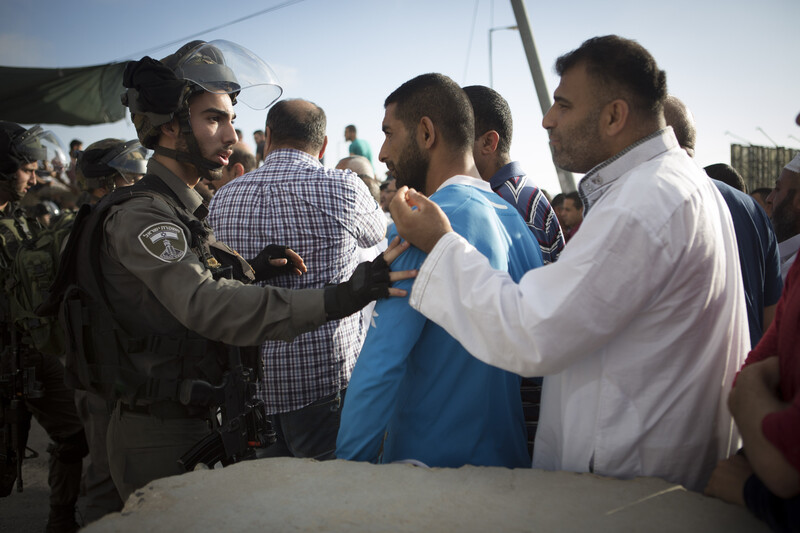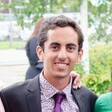Rights and Accountability 14 July 2016

Israeli border police push Palestinian men as they try to cross through the Qalandiya checkpoint, between the cities of Jerusalem and Ramallah in the occupied West Bank, on 11 July.
ActiveStillsA few days ago, I was driving through Qalandiya checkpoint for the first time since I came back to Jerusalem.
My dad, sitting next to me, had to yell “stop here!” at me as I was queuing behind a car at the checkpoint.
“You’re too close,” he said, “stop and wait for them to call you, otherwise they’ll shoot you and not even care.”
When I left here to begin my life as a university student four years ago, and despite my sense of general optimism, I never really believed that I would come back to a better and more hopeful Jerusalem.
Over the four years, I would come back during the summer and end up leaving again with a strong belief that things would only be worse the next time I’d be home.
Here I am now, four summers later, having earned my degree, and I believe Jerusalem is worse than it has ever been for its non-Jewish inhabitants, the Palestinians.
Despite this depressing assessment, I have been looking forward to come back to Jerusalem as it is not only the city that I grew up in, but it is the place where I want to embark on the journey of being a young adult.
Fear everywhere
Two years ago, I wrote about the pervasive fear we Jerusalemites feel in our own city.
Today, sadly, this fear is even more intense and tangible. It is not just fanatics or nationalist mobs that worry me, it is every armed Israeli – citizen, police and military – who could end my or anyone else’s life in a second for no reason and without anyone batting an eye.
Since last summer, the ugliness of life in Jerusalem has come to show.
Hundreds of Palestinians of all ages have been harassed, brutalized, arrested, shot or killed.
This is in a city where Israel’s slow, steady but systematic discrimination is forcing Palestinian children out of schools and Palestinian families out of their homes.
In April, Maram Salih Hassan Abu Ismail, a 23-year-old mother of two small children, reportedly five months pregnant, and her 16-year-old brother Ibrahim Salih Hassan Taha, were gunned down by Israeli personnel at the same Qalandiya checkpoint, in the occupied West Bank, north of Jerusalem.
Israel claimed the pair were killed during an attempted knife attack on soldiers, but eyewitnesses described an execution of two people who didn’t understand commands being shouted at them in Hebrew and presented no threat to anyone.
The private firm contracted by the Israelis to man the checkpoint carried out an “internal investigation” and absolved itself of any wrongdoing.
The siblings were among more than 220 Palestinians, as well as more than 30 Israelis and two Americans, who have died since a new phase of violence began last October.
And according to Israel’s B’Tselem human rights group, Maram and Ismail were among dozens of Palestinians killed when they posed no threat in slayings “tantamount to executions.”
Driving while Palestinian
On the day I drove through Qalandiya, I recall my dad reminding me repeatedly how I should be extra careful how I am perceived by Israelis while on the road as anything they deem suspicious could have fatal consequences.
It has become standard in recent months for Israelis to judge any driving irregularities or accidents to be deliberate vehicular attacks, prompting Israelis to attack the driver and ask questions later.
Last month, an Israeli driver plowed his car into a Tel Aviv restaurant, killing two people, before a mob pulled him from the car and beat him believing him to be a Palestinian attacker.
But the man had suffered a heart attack. He died, though it was unclear whether it was due to the beating or the heart attack.
Sometimes just driving around puts your life at risk. On Wednesday, three young men in al-Ram came under a hail of bullets from Israeli forces raiding the village north of Jerusalem. One, Anwar al-Salaymeh, 22, was killed. Another was critically injured and the third detained.
An Israeli spokesperson told the Ma’an News Agency that the soldiers “saw a speeding vehicle heading towards them” and opened fire.
An autopsy was ordered for al-Salaymeh, after it was discovered that he was shot in the back three times, challenging the Israeli narrative.
And during Ramadan, 15-year-old Mahmoud Badran was killed when Israeli soldiers fired on the car he and friends were riding in on their way home from a late-night pool party. In that case, Israel admitted the car was “mistakenly hit.”
Merely walking around in Jerusalem’s Old City for the first time this summer was an uneasy experience.
Anything deemed provocative by the pervasive Israeli police could have costly consequences. It is an environment of fear designed to make us Jerusalemites feel uncomfortable and unwelcome in our own city.
First resort
The killing of Fadi Alloun last October, and other instances of Israeli police shooting Palestinians as mobs cheered them on, are memories we cannot shake and reminders of the precarious nature of our continued existence in this place.
Newly revealed documents show that Israeli police have been authorized to use lethal force as a first resort against any Palestinian seen to throw stones or firecrackers.
For years, Israel claimed that lethal force was only a last resort – even though in practice Israeli forces killed frequently, without provocation and with total impunity.
But you would never see similar measures taken against Jewish stone throwers or attackers who harass Palestinians regularly across the West Bank. Instead, the attackers habitually enjoy army protection.
Every few days I wake up to news of Palestinians being shot for acting “suspiciously” or allegedly possessing a knife. In all these cases, Israel is judge, jury and, often, executioner, with no credible justice system in place to independently investigate such claims or killings.
I still remember a few years back when a man in front of me at Qalandiya checkpoint was kicked by soldiers, humiliated and reduced to tears as he was denied passage through the checkpoint.
He had been carrying a bag full of cooking equipment and chefs knives and he had multiple papers showing he was part of a culinary school in Jerusalem.
Today, a person in a similar situation would have been killed and no one would question it as the mere possession of a knife has become enough of an excuse legitimizing the summary execution of Palestinians.
Still standing
An internal police report exposed by the Tel Aviv newspaper Haaretz this week, revealed, to no surprise of any Jerusalemite, that Israeli Border Police in Jerusalem “deliberately provoke Palestinians” in order to get a violent response.
One such manufactured provocation in Issawiyeh, in January, led to a confrontation in which Israeli forces shot 12-year-old Ahmad Abu Hummus in the head, causing severe brain damage.
Social media is never lacking in daily videos documenting the regular harassment, searches and humiliation of Palestinian youths in Jerusalem that lead to similar violence.
It is weird living in Jerusalem right now, especially knowing that this situation only strengthens my determination to stay here, live here and fight for this city.
I know too that if I wanted to write about all the forms of abuse against Palestinians in Jerusalem, I would be writing endlessly for days.
It is a situation where the power and might of the whole Israeli state is determined to alienate Palestinian Jerusalemites. However, this cruelty and injustice only breeds further resistance and defiance.
They may deem our lives worthless, our dignity of no value, our existence an inconvenience, but I believe Jerusalem continues to stand tall and defy the oppression no matter how dark the times have become.






Comments
Great article!
Permalink Fares Abukhater replied on
Hey Jalal, your cousin Fares here. I just wanted to commend you on a well-written article. Keep on making us proud with your work! Your article has been shared and future ones will continue to be shared ... so keep going strong! When you stand tall, we will stand right behind you!
This is a terribly disturbing
Permalink Robert H Stiver replied on
This is a terribly disturbing report by an articulate young man. How long will this continuing lust by Zionists to drive the Palestinians to distraction and death be accepted by "civilized" people, societies, nations, and the world? The answer appears to be "stay tuned, because the full exposure of and resolute action to put paid to the Zionist project is nowhere near." My greatest empathy for the Palestinian people. Viva Palestine! Palestine Is Still The Issue!